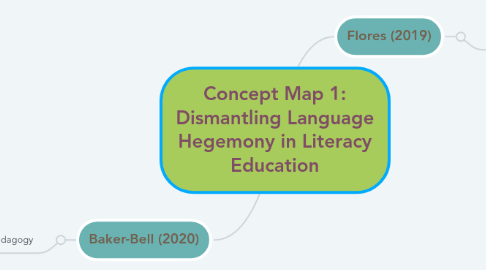
1. Baker-Bell (2020)
1.1. Black Language Pedagogy
1.1.1. inspired by her own family history of racial violence, her inadequate language education training, and theorist bell hooks' notion of "a revolutionary pedagogy of resistance - a way of thinking about pedagogy in relation to the practice fo freedom" p. 2
1.1.2. antiracist language and literacy education
1.1.2.1. must be intersectional
1.1.3. antiracist critical media literacies + black digital activism
1.1.3.1. "grounded in [Black] communities' knowledges to counter and rewrite[...] damaging narratives" p. 4
1.1.3.1.1. i.e. the way popular media portrayed Trayvon Martin as a troublemaker who got what was coming to him, vs. the upstanding portrayal of his killer George Zimmerman.
1.1.3.2. examples: #metoo movement founder Tarana Burke and artist and activist Bree Newsome Bass tweets, especially in the wake of NZ shooting. p. 4
1.1.3.3. "part of our ancestral memory and knowledge of our predecessors" p. 6
1.1.4. Acknowledges institutionalization of White supremacy
1.1.4.1. older than the U.S. colonies (Ben Johnson's The Masque of Blackness comes to mind) p. 6
1.1.5. "critical media pedagogies overlook the literacy practices that youth are already engaging in that speak back to agents and forces within media that work to stigmatize, characterize, and marginalize them. To move toward antiracist critical media literacies in the classroom, language and literacy educators must build on the already critical race media literacy that black students bring with them to their classrooms." p. 6
1.1.6. Like Flores' denunciation of raciolinguistic ideologies, sees Black linguistic racism enacted in the paradigm that Black students are deficient in White English, when in fact the deficiency is in the educational system's response to the legitimacy of Black English. p 8
2. Flores (2019)
2.1. language architecture
2.1.1. framework to replace "academic language" deficit ideology
2.1.1.1. uses example of highly specialized languages such as the lexicon of baseball to argue that the dichotomization of academic vs. non-academic is fallacious and designed only to exclude and oppress minoritized while upholding oppressive educational structures.
2.1.2. sees "language practices of Latinxs and other racialized students as already aligned with CCSS." p 22 & p. 28
2.1.3. raciolinguistic perspective - "shifts focus from the linguistic practices of the speaker/writer toward the perceiving practices of the listener reader." p 24
2.1.3.1. created for and perpetuated by white listener/reader subject
2.1.3.2. serves to subordinate "racialized speakers as coming from communities with language deficiencies that need to be policed and corrected" p 24
2.1.4. argues that role of educational linguists must shift toward "developing new listening/reading subject positions that recognize the complex linguistic knowledge that their students have developed as part of their lived experience." p 24
2.1.5. "home language practices integral to the development of [the racialized students'] academic identities rather than simply a bridge at best or a barrier at worst." p. 28
2.1.6. methodology: exploration paradigm
2.1.6.1. foregrounds language choice p 29
2.1.6.2. "seeks to bring students attention to the ways in which authors construct particular texts without relying on the crude dichotomy of academic and non-academic. p 29
2.1.7. uses architecture metaphor p. 25
